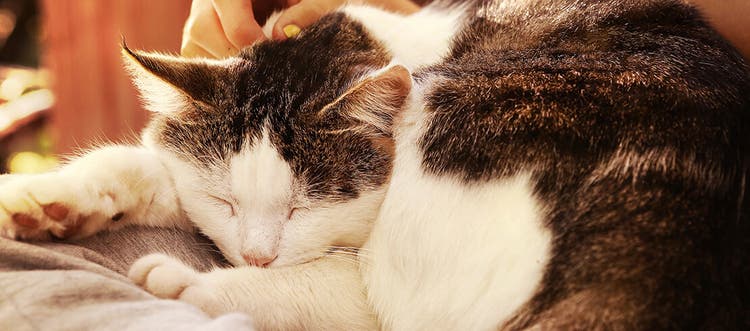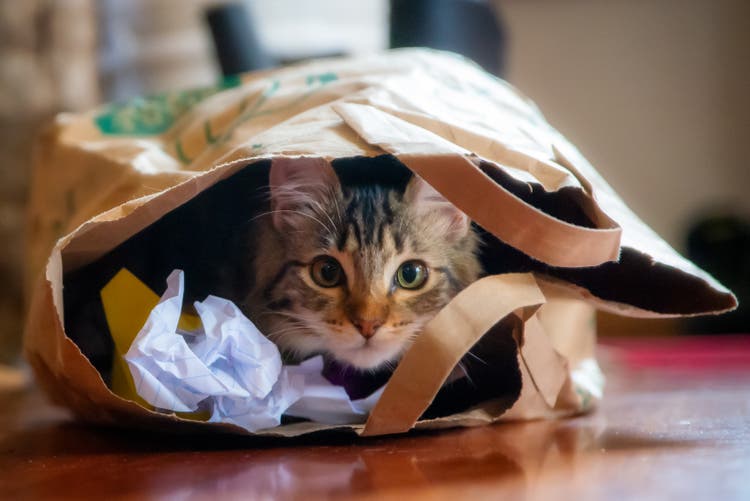Plus a new cat checklist to make the most of your shelter’s expertise.
There’s nothing like changing a life — unless you’re also saving a life. And that’s just what you’re doing when you adopt a cat from a shelter. However, bringing home a new cat or kitten can be stressful for you and the animal. Your shelter’s staff is a great resource, as they have worked hard to prepare adoptable cats for their forever homes. They can help you navigate the adoption process, match you with the right cat and answer any questions you have.
Below are some questions to ask shelter staff before adopting a cat. If you are new to cat ownership, we’ve also included a first-time cat owner checklist of necessary supplies.
Things to know before getting a cat: Ask the shelter — and yourself — these important questions first
- Should I adopt a cat? Consider your lifestyle, how long cats typically live, and the makeup of your home, such as space, kids and other pets.
- How much does it cost to adopt a cat from a shelter?
- How much does a cat cost in general? Consider food, supplies, trips to the vet’s office, medication and more.
- What do I need to do to cat proof my home? Consider items that can easily be knocked off shelves and toxic houseplants.
Ask the shelter about a cat’s needs and personality
Shelter staff and volunteers spend ample time learning about their adoptable cats’ unique personalities and needs. By the time a cat is ready for adoption, the staff has interacted with them and gotten to know their temperament and daily habits through playtime, mealtime, downtime, and health and well-being checks. In short, the staff is the best resource for finding out more about an adoptable cat’s personality.
Questions to ask about a cat’s needs and personality:
- Is the cat sociable or solitary? Do they enjoy being around people, or are they more independent?
- Does the cat like to be handled or picked up?
- What types of activities does the cat enjoy? Do they like to play, or do they prefer to snuggle?
- Would the cat get along with other pets?
- Is the cat friendly around children?
- Does the cat have notable behavioral quirks or preferences?
Ask the shelter about a cat’s vaccination history and health
Shelter professionals understand the need to immediately identify, treat or help prevent fleas, ticks, heartworms, intestinal worms and ear mites. After all, many shelter animals bring unwanted guests along at check-in, and it doesn’t take much for a few tiny pests to become a large, shelter-wide problem.
The staff ensures adoptable cats have received effective treatment or prevention products to help reduce the risk of various parasites. They also perform a wellness exam and document any past or current medical conditions. These checkups, vaccinations and preventives help prepare an adoptable cat for your home.
Questions to ask about a cat’s health history:
- How did the cat come to the shelter?
- How old is the cat?
- Did the cat have any health issues when they arrived at the shelter?
- Should I be worried about feral cat diseases?
- Does the cat have any current medical conditions?
- Do they take medication?
- What is the best cat food to use or does this cat require a special diet?
- Does the shelter recommend or work with a specific veterinary office?
- What about cat vaccinations? When will the cat need additional vaccinations or parasite prevention products?
Never owned a cat? Here’s a first-time cat owner checklist
If you’ve never owned a cat, it’s important to have adequate supplies at home before visiting a shelter. Items to consider include:
- Cat carrier or crate to transport your cat home from the shelter, and to and from the vet
- Litter box and scooper – adding a litter mat can help keep litter contained
- Cat litter
- Food and water dishes
- Cat food – initially, the best cat food is the type of food the cat you’re adopting is accustomed to and slowly transition to new food in order to avoid giving your cat an upset stomach
- Cat treats
- Scratcher or scratching post
- Toys
- Cat bed
- Brush and nail clippers
- Collar (look for one that breaks away) and ID tag – you might also consider a microchip
By asking the shelter staff lots of questions and learning more about their cats, you’re paving the way for a lifelong bond with a cat that’s just the right fit.





